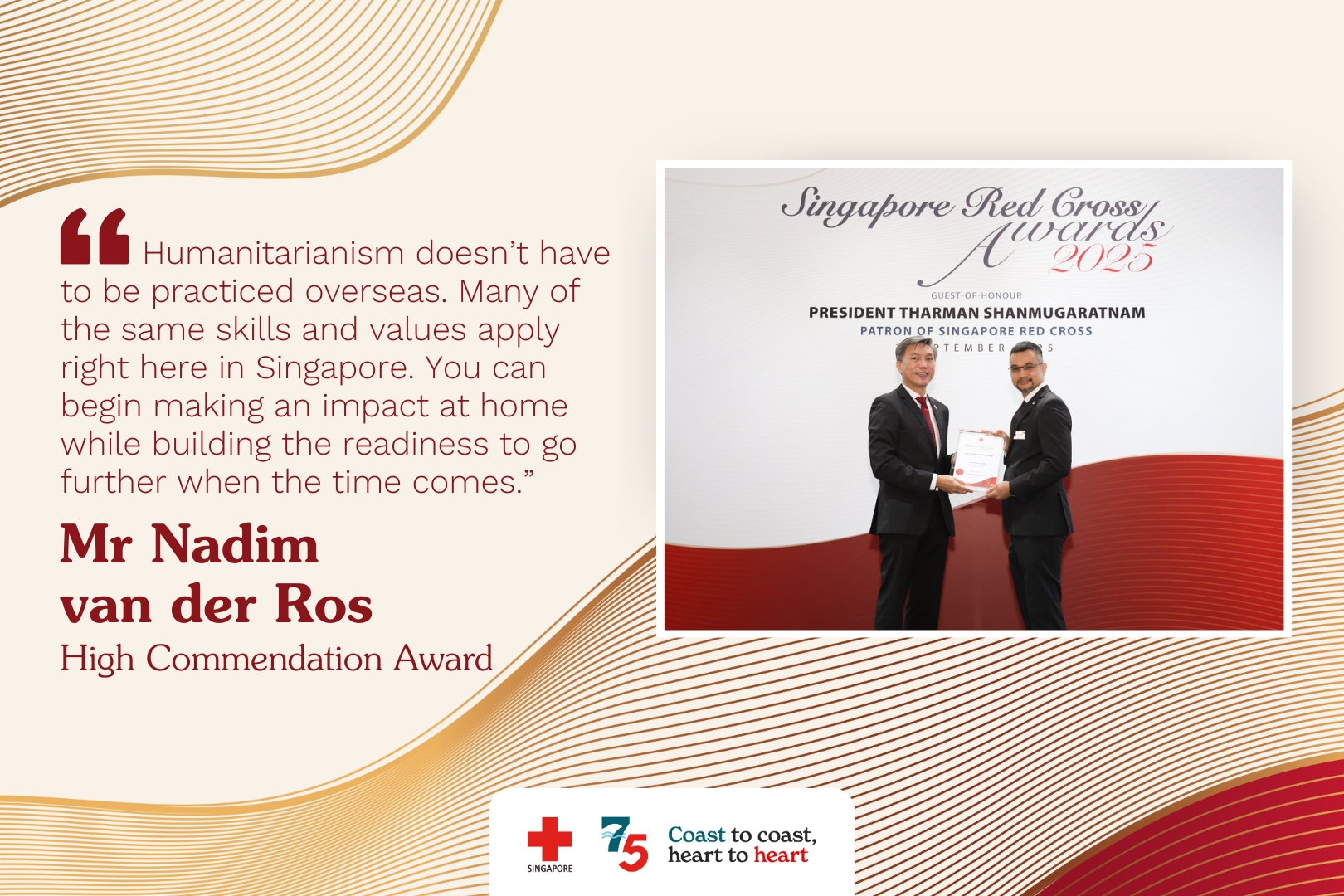
Mr Nadim van der Ros acknowledges that his volunteer journey started later than ideal. However, that has not stopped him from giving it his all. And now at 48, he is being awarded with the High Commendation Award — an indicator of his exceptional and sustained voluntary service to the Singapore Red Cross.
What began as a simple intention to contribute to the local community evolved into a profound engagement with global humanitarian efforts when Mr Nadim signed up for the Overseas Disaster Deployment Training (ODDT) with the Singapore Red Cross.
He was at once blown away by the engaging training sessions and inspired by the passion of trainers such as Muchsin Dahalan. More importantly, it was then that he felt a strong connection to the broader humanitarian community and recognised that he was equipped to provide the support they were looking for in planning and communications.
Coincidentally, around the same time that Nadim was going through the ODDT, he had also joined the Singapore Armed Forces (SAF) Volunteer Corps. There, he underwent two weeks of foundational training designed to build discipline, teamwork, and operational readiness.
“While very different in context, that experience shaped a mindset that aligns well with certain aspects of disaster response and ODDT — it taught me more about the importance of being focused under pressure and mission-driven.”
With the stars aligning, Nadim knew he had to keep going.
The Heart Part Of Being On Mission
Volunteering in disaster response could sound cool and even James Bond-esque to many. Yet, in reality, it requires travel and, therefore, being away from home for a period of time.
To that, after cheekily joking that his family enjoys the short breaks from him when he is away, Nadim insists it is crucial volunteers garner the support of their families through an accurate explanation of why they do what they do.
“When deployed, your full attention has to be on the needs of the mission, your team, and the affected communities. You can't afford to be distracted by things at home. That is why you need to be able to explain why your absence matters — especially when you're focusing your attention on communities elsewhere while your own may need you too.
For response missions, this dynamic is even more pronounced due to safety and security concerns, so managing those risks and setting expectations clearly with loved ones becomes an important part of preparation.”
Looking To Be On The Frontlines Too?
“Overseas disaster response isn’t for everyone — and that’s perfectly okay. You’ll only know if it’s right for you once you’ve had some exposure: working with unfamiliar people, navigating uncertain conditions, and standing with communities facing crisis.
I believe that, in order to keep Singapore safe and secure, we need to also contribute to strengthening the resilience of communities around us. Especially during a crisis, when local capacity is stretched or exceeded, our support can play a meaningful role — not as outsiders with all the answers, but as neighbours willing to stand alongside others.
If you’ve just completed ODDT, look for ways to deepen what you’ve learned. SRC’s Overseas Humanitarian Projects (OHPs) are a great entry point because they help you build real-world experience in lower-pressure environments. Supporting ODDT as a trainer is another excellent way to stay close to the material, learn from others, and build your confidence.
And remember — humanitarianism doesn’t have to be practiced overseas. Many of the same skills and values apply right here in Singapore. You can begin making an impact at home while building the readiness to go further when the time comes.”
And the Award Goes to…
“To be honest, I wasn’t aware I was receiving the ‘High Commendation Award’ — I didn’t even know I had been nominated!
I do what I do because I believe in the Singapore Red Cross as a humanitarian concept, especially now given the state of the world. If I can apply my skills to support and strengthen vulnerable communities, that’s where I want to be.
As an instructor, staying engaged keeps me sharp, but the real reward is in the multiplier effect — supporting learners who go on to make an even greater impact than I could alone.”

